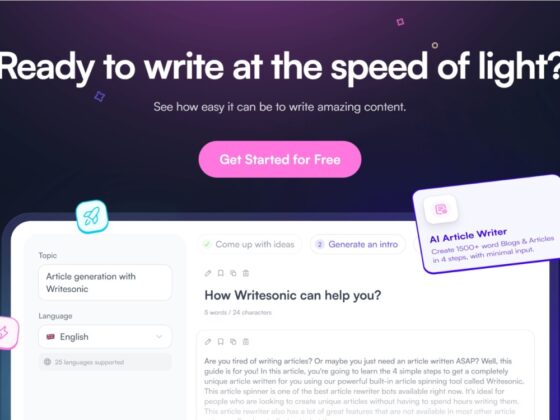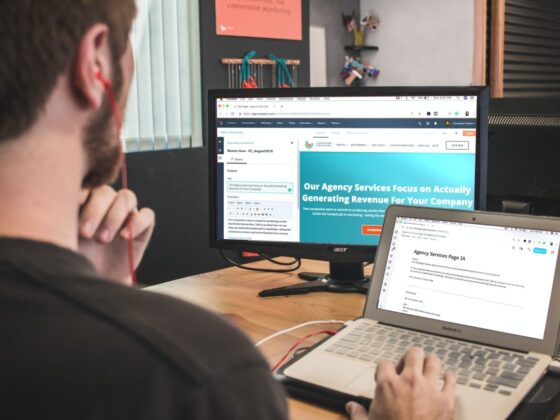In the past, artificial intelligence (AI) was a novel topic that only existed in science fiction novels and movies. However, AI is here and it has become a buzzword for marketers. In addition to helping with things like email marketing personalization and hyper-targeted online ads, AI can be used in SEO to determine how people are searching for your brand online and what types of content you should create.
How can AI be used in SEO?
Engagement & Content Generation
AI can help you generate content that is engaging, relevant to your audience, interesting to them, and useful. Here's how:
- Engaging – AI can analyze user behavior on your website and then use this information to generate content that resonates with users. While this is not a new practice in marketing, AI improves upon it by being able to learn over time how different types of content perform better than others based on the actual data available at that time (and not just your intuition). This has several benefits: firstly, you'll know that the content you're creating is likely going to work; secondly, it allows you to do more with less effort; thirdly if done correctly all this data collection should improve both user experience as well as return on investment (ROI).
- Relevant – With the amount of information available on the internet today there's no excuse for any business not being able to tailor their messaging appropriately for their audience(s). The problem however lies in finding what keywords are most relevant for each particular audience segment within such large quantities of data available online today! This is where AIs come into play by helping us find those keywords which we would otherwise never have been able to discover ourselves due to their inherent complexity or lack thereof…
AI for Improving Organic CTR
As you know, organic CTR is a crucial part of the SEO process. It's not just about getting clicks; it's also about keeping users on your site, which can lead to conversions and more sales. So how can you use AI to improve your organic CTR?
To start with, you'll want to figure out what pages are getting clicked and why they're getting clicked. Once you know that information, then you can start using more advanced SEO strategies like targeting specific audiences or using rich snippets instead of plain text links in order to increase traffic and conversion rates on those pages.
AI is especially useful when it comes time for local SEO because data from Google Maps can be integrated into other parts of an online presence so that businesses are able to reach customers who already know about them but aren't actively searching for them yet (like people who live nearby).
Automated Detection of Broken Links
A broken link is one that does not lead to a valid page on your site, such as when you click on a broken link to an image and get the 404 error. They are bad for SEO because they can cause visitors to leave your site and search engines to rank it lower in search results.
Automated detection of broken links can help you find problems with your website so that they can be fixed immediately. There are two ways that automated detection works: crawling and searching for them. Crawling means having a bot perform automated searches through all pages on the site until it finds all relevant links, while searching means using Google’s Custom Search Engine (CSE) feature to look through individual pages by keyword or phrase across multiple websites at once—this method is better suited for larger sites since it takes longer than crawling does but provides more accurate results since there’s no need for human oversight during the process.
Discovery of New Link Opportunities
Link prospecting is the act of finding new links for your website. It's a time-consuming process, but it can be done manually or through automation. AI can also be used to find new link opportunities, which it does by using heuristics and machine learning techniques.
AI can potentially find more links than humans because it has no limitations on its work hours or capacity for making decisions on behalf of a team of people.
Optimizing for Search Intent
AI can help you understand what people are looking for.
Do you have a sense of your audience’s needs? If so, how much of that is based on data and how much is informed by intuition? When it comes to SEO, the difference between the two can be crucial. In fact, there are many instances where AI-powered tools can provide valuable insights into search intent that would otherwise go unnoticed by human eyes alone.
Keyword Research & Suggestions
One of the most common uses of AI in SEO is to help with keyword research and suggestions. Most people are familiar with the concept of a Keyword Planner, but it's not always easy to find good ones. Even if you do find one, they can be expensive and require you to pay for access.
In contrast, many modern AIs use machine learning algorithms that can analyze your site's existing content (or other sites like yours) to provide suggestions based on what has worked before—and for free!
The best part about using AI for keyword research is that you don't have to worry about getting penalized by Google because you're scraping their data—you're just using their technology!
Artificial intelligence is here to stay and can help with many things.
AI is here to stay. It's not a fad, and it's not going away anytime soon. As more companies adopt AI technologies, you'll see AI become more and more common in everyday life—but that doesn't mean you have to fear it or run away in terror. In fact, I'd argue that if you embrace technology instead of fearing it, you can benefit from its benefits in many ways that will make your life easier and improve your business efficiency.
AI isn't a replacement for humans; rather, it's meant as a tool to make humans faster and better at their jobs. At its core, AI is an algorithm designed by people who want something done quickly or efficiently—and then they give instructions on how (or what) those instructions should be executed once the program has been written down into code form (and I'm simplifying things here). The point isn't how these programs work or why they work; rather than understanding how they do so much as seeing what they do when given certain inputs into their algorithms/programs/code bases that enable them with intelligence far beyond what any human could accomplish in similar circumstances using only our natural cognitive capabilities alone!
Conclusion
I think that the key takeaway from all this should be that artificial intelligence is here to stay and can help with many things. It's not a useless relic from a bygone era, and it should never be treated as such. In today’s world, when so much communication happens online, it’s easy to forget the power of language—but knowing the ins and outs of your grammatical choices still gives you a huge advantage in both the written and spoken word; it still affects how well your message reaches your audience, and how willing they are to listen. If you’re stuck on the idea that AI is an outdated concern of the past, let me leave you with one final thought: if your spelling and grammar are so poor that no one can understand what you’re saying, what’s the point of speaking at all?
Another post on the topic: Potency Enhancers: Unlocking Peak Performance with Science-Backed Solutions









